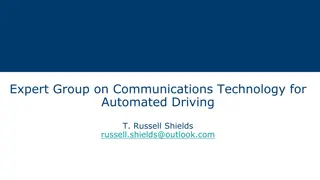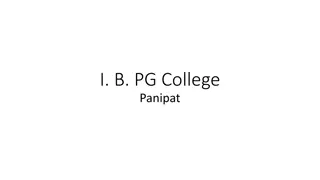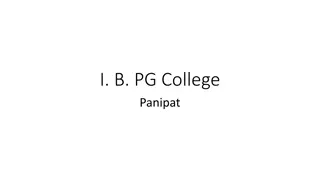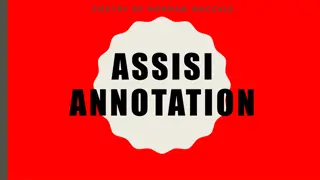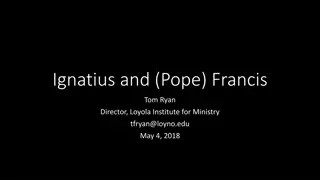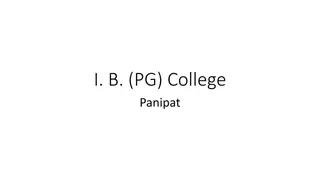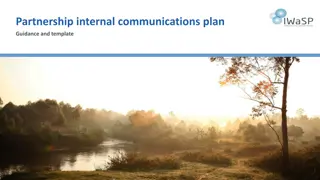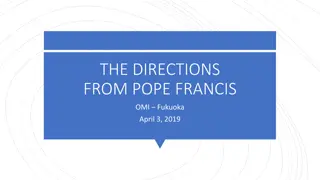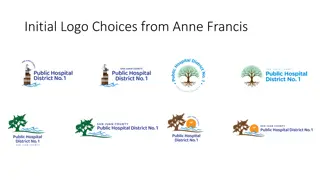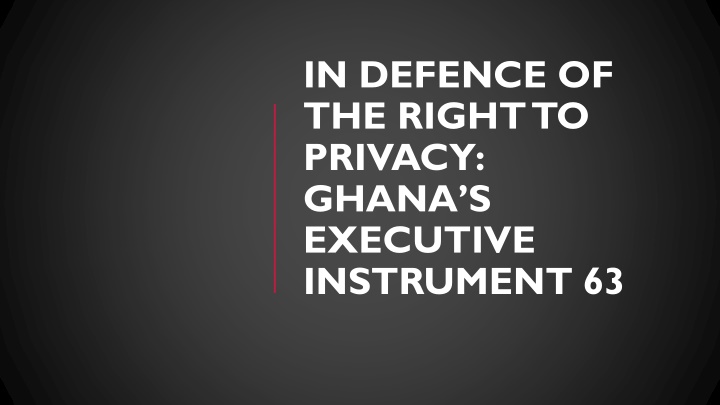
Ghana's Executive Instrument 63: In Defence of the Right to Privacy
Discover how Ghana responded to the Covid-19 pandemic with Executive Instrument 63, focusing on the establishment of emergency communication systems and its implications for privacy rights. Learn about the provisions, justifications, and impact of EI 63 on public health and personal data privacy.
Uploaded on | 1 Views
Download Presentation

Please find below an Image/Link to download the presentation.
The content on the website is provided AS IS for your information and personal use only. It may not be sold, licensed, or shared on other websites without obtaining consent from the author. If you encounter any issues during the download, it is possible that the publisher has removed the file from their server.
You are allowed to download the files provided on this website for personal or commercial use, subject to the condition that they are used lawfully. All files are the property of their respective owners.
The content on the website is provided AS IS for your information and personal use only. It may not be sold, licensed, or shared on other websites without obtaining consent from the author.
E N D
Presentation Transcript
IN DEFENCE OF THE RIGHT TO PRIVACY: GHANA S EXECUTIVE INSTRUMENT 63
COVID 19 PANDEMIC With the discovery of the novel Covid-19 pandemic in 2019, almost every country deployed measures to contain its spread. This rather novel pandemic left many states in panic with no explicit or implied approach in response to it. In addition to plans deployed, sometimes, in ad hoc manner to the pandemic, the Government of Ghana passed and issued a series of Executive Instruments, all aimed at curbing and controlling the pandemic.
E.I. 63 is the maintenance of Public Health which has been endangered severely by the Covid-19 pandemic.
ESTABLISHMENT OF EMERGENCY COMMUNICATION SYSTEM INSTRUMENT, 2020, UNDER EXECUTIVE INSTRUMENT, (E. I. 63) Executive Instrument 63, precisely section 1(2) which enjoins network available personal information of subscribers to the Nation Communications Authority. operators to make
OTHER LAWS The Imposition of Restrictions Act of 2020 (Act 1012), on the 21st of March 2020, with its implementing provision under the Executive Instrument, E. I. 64 and 65, 2020. The Executive Instrument, E. I. 66 issued to extend the lock- down period under E. I. 64.
E.I 63 The preamble of the instrument reads in part as follows: Whereas there is an urgent need to establish an emergency communications system to trace all contacts of persons suspected or actually affected by a public health emergency and identify the places visited by persons suspected of or actually affected by a public health emergency;
SECTION 1(2) Section 1(2) of the instrument provides as follows: A network operator or service provider shall make available the following: (a) all caller and called numbers; (b) Merchant Codes; (c) Mobile Subscriber Directory Number Codes; and (d) International Mobile Equipment Identity Codes and site location. Station International
JUSTIFICATION OF EI 63 The Executive Instrument indicated that Ghana is committed to dealing with emergency situations especially public health emergencies. Hence, there was an urgent need to establish an emergency system to trace all contacts of persons suspected of or actually affected by a public health emergency and identify the places visited by the persons suspected of or actually affected by a public health emergency.
A BREACH OF FUNDAMENTAL HUMAN RIGHT To rely on EI 63 to attempt to deploy a mass surveillance on citizens is a violation of the fundamental human right to privacy. The provision is a limitation on citizens right to privacy on an extremely large scale. Many have argued that [t]he E.I. opens a new window politically for the government ahead of an election to have unfettered access to the telecom records and mobile financial records of citizens. [See: https://citinewsroom.com/2020/09/sam-george-wants-e-i-63-scrapped- to-protect-privacy-of-citizens/ >Accessed on 28 February 2022]
THE CONSTITUTION AND PRIVACY IN GHANA Article 18 Right to privacy Not absolute [e]xcept in accordance with law and as may be necessary in a free and democratic society for public safety or the economic well- being of the country, for the protection of health or morals, for the prevention of disorder or crime or for the protection of the rights or freedoms of others. The Constitution, 1992 protects against interference with one s privacy a word covering not only searches but any form of intrusion into one s personal life.
Republic v Tommy Thompson Books Ltd and Others [1997-98] 1 GLR 515 stated as follows: Absolute and unrestricted individual rights wholly freed from any form of restraint cannot exist in a modern democratic society
CONSTITUTIONAL INCONSISTENCY Article 2(1) Every law is measured against the constitution The power of judicial review of the constitutionality of legislation, which is explicitly conferred on this court by articles 2(1) and 130 (1) of the Constitution. Martin Kpebu v.Attorney-General Supreme Court case. Any substantive or procedural legislation which is inconsistent with the enumerated grounds, risks nullification on grounds of unconstitutionality.
UNCONSTITUTIONALITY OF EI 63 The Purpose for the Release, or Collection of citizens Personal information is illegitimate. National security, public order, Public safety may be justified. UN Special Rapporteur on the issue: The use of amorphous concept on National Security to justify invasive limitation on the enjoyment of human rights is of serious concern. The concept is broadly defined and is thus vulnerable to manipulation by the State as a means of justifying actions that target vulnerable groups such as human rights defenders, journalists, or activists. It also acts to warrant often unnecessary secrecy around investigations or law enforcement
The Presidents power to make E.I. 63 is subject to the Rules of Administrative Justice. Council for Civil Service Unions y Minister for the Civil Service (1985]AC 374. Lord Diplock laid down three heads under which administrative justice is subject to judicial control as illegality, irrationality, and procedural impropriety. According to Lord Diplock Irrationality refers to a decision which is so outrageous in its defiance of logic or of accepted moral standards that no sensible person who had applied his mind to the
While there cannot be a reasonable doubt that Covid-19 poses an extreme Public Health threat, it is extremely doubtful if the collection of personal information could serve any legitimate purpose in the fight against Covid-19.
Prior declaration of state of emergency The power to make E.I. 63 is derived from Act 775 which allows him to make such requests on Service Providers under Section 100, was made quite clear in the long title of E.I. 63. However, reading Act 775 as a whole, there is a condition precedent in Section 100 which the President failed to invoke. Thus, the condition precedent is that the President should have first declared a state of emergency under Article 31 of the 1992 Constitution. Section 99(1) ofAct 775 states: Where a state of emergency is declared under Article 31 of the Constitution or, another law, an operator of communications or mass communications systems shall give priority to requests and orders for the transmission of voice or data that the President considers necessary in the interest of national security and defence. The president failed to declare a state of emergency prior to issuing E.1. 63 and to
CONCLUSION EI 63 particularly section 1(2) serves no legitimate purpose. Its current formulation without the consent of citizens is a violation of fundamental rights to privacy. Struck down as unconstitutional, null and void.


